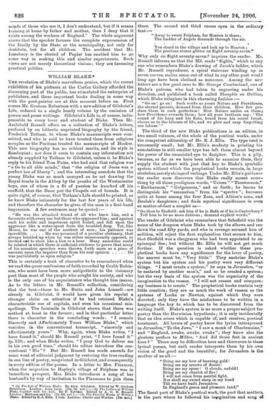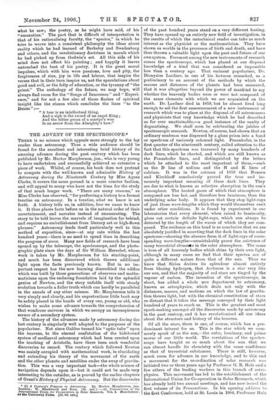WILLIAM BLAKE.* THE revelation of Blake's marvellous genius, which the
recent exhibition of his pictures at the Carfaz Gallery afforded the discerning part of the public, has stimulated the enterprise of publishers, and three important books dealing in some way with the poet-painter are at this moment before us. First comes Mr. Graham Robertson with a new edition of Gilchrist's Life, reduced to a single handy volume by the omission of poems and prose writings. Gilchrist's Life is, of course, indis- pensable to every lover and student of Blake. Then Mr.
Archibald Russell offers us a collection of Blake's letters, prefaced by an hitherto imprinted biography by the friend, Frederick Tatham, to whom Blake's manuscripts were com- mitted, and who is said to have treated them from religious scruples as the Puritans treated the manuscripts of Hooker. This new biography has no critical merits, and its style is flamboyant ; nor does it seem to contain any information not already supplied by Tatham to Gilchrist, unless it be Blake's reply to his friend Tom Paine, who had said that religion was "a tie to all able minds," that "the religion of Jesus was a perfect law of liberty " ; and the interesting anecdote that the young Blake was so much annoyed as he sat drawing the Royal tombs in the Abbey by the pranks of the Westminster boys, one of whom in a fit of passion he knocked off his scaffold, that the Dean put the Chapels out of bounds. It is quite right, of course, that Tatham's Life should be printed, as he knew Blake intimately for the last few years of his life, and therefore the character he gives of the man is a first-hand
impression. A few sentences may be quoted :— "He was the attached friend of all who knew him, and a favourite with every one but those who oppressed him; and against such his noble and impetuous spirit boiled, and fell upon the aggressor like a water-spout from the troubled deep. Yet, like Moses, he was one of the meekest of men; his patience was
incredible He was possessed of a peculiar obstinacy, that always bristled up when he was either unnecessarily opposed, or invited oat to show like a lion or a bear. Many anecdotes could be related in which there is sufficient evidence to prove that many of his eccentric speeches were thrown forth more as a piece of sarcasm upon the inquirer than from his real opinion He was particularly so upon religion."
This is certainly a trait of character to be remembered when we read the queer confessions of faith recorded by Crabb Robin- son, who must have been more antipathetic to the visionary poet than most of the people who sought his society, and who is the only one of his acquaintance who thought him insane. As to the letters in Mr. Russell's collection, considering that the best—those to Mr. Butts and John Linnell—are already in Gilchrist, it would have given his reprint a stronger claim on attention if he had retained Blake's characteristic use of capitals, and even his occasional mis-
spellings. The facsimile in Gilchrist shows that there was method at least in the former ; and in that particular letter there is character in the concluding words : "I remain Sincerely and Affectionately Yours William Blake," which vanishes in the conventional transcript, "sincerely and affectionately yours." Why, again, when Blake writes, "I have found it," should Mr. Russell print, "I have found it" (p. 129) ; and when Blake writes, "I pray God to deliver me in his own good time," should his editor introduce the con-
ventional "His "? But Mr. Russell has made amends for some want of editorial judgment by restoring the true reading in one line of poetry, misprinted in Gilcluist, and consequently in every edition of the poems. In a letter to Mrs. Flaxman, when the migration to Hayley's village of Felpham was in immediate prospect, Mrs. Blake introduces a song of her husband's by way of invitation to the Flaxmans to join them
• (1) The Life of William Blake. By Alex. Gilchrist Edited by W. Graham Robertson. London : John Lane. [10s. 6d. net.)—(2) The Letters of William Blake, together with 'Li hie fe. By F. Tatham. Edited by A. G. B. RusselL
London Methuen and Co. [7s. 6d. net.]--(3) The Poetical Works of William Blake. Edited by E. J. Ellis. 2 vols. London Cbatto and Windus. [12s. net.]
there. The second and third verses open in the ordinary text :— " Away to sweet Felpham, for Heaven is there; The Ladder of Angels descends through the air.
You stand in the village and look up to Heaven ; The precious stones glitter on flight seventy-seven." Why only oil flight seventy-seven ? inquires the reader. Mr. Russell informs us that the MS. reads "flights," which to any one who remembers Blake's drawing of Jacob's ladder, which Mr. Russell reproduces, a spiral staircase winding up in seven curves, makes sense out of what in any other poet would long ago have been obelised as nonsense. Among the new letters are a few good ones to Mr. George Cumberland, one of Blake's patrons, who had taken to engraving under his direction, and published a book called Thoughts on Outline, which Blake eulogises in this charming fashion :— " Go on ! go on ! Such works as yours Nature and Providence, the eternal parents, demand from their children. How few pro- duce them in such perfection! How Nature smiles on them ; how Providence rewards them ; how all your brethren say : • The sound of his harp and his flute, hoard from his secret forest, cheers us to the labours of life, and we plow and reap forgetting our labour.'" The third of the new Blake publications is an edition, in two small volumes, of the whole of the poetical works, under the competent editorship of Mr. E. J. Ellis. The type used is necessarily small ; but Mr. Ellis's modesty in printing his annotations in still smaller type has left them almost beyond the power of the unassisted eye to decipher. This is a pity, because, so far as we have been able to examine them, they supply the student with just that key to Blake's symbolic system without which the prophetical books remain, in large stretches, merely strings of verbiage. Under Mr. Ellis's guidance the reader soon discovers that Blake really meant some- thing by all those prodigious words, "Urizen." " Theotormon,' " Enitharmon," " Golgonooza," and so forth ; he learns to distinguish his "emanation" from his "spectre "; becomes quite at home among the four Zoas, and Albion's sons, and
Beulah's daughters ; and finds mystical significance in even so matter-of-fact a couplet as—
"Go thou to Skofield: ask him if he is Bath or if he is Canterbury ? Tell him to be no more dubious ; demand explicit words."
The reader of Gilchrist who remembers that Schofield was the name of the dragoon whom Blake took by the elbows and ran down the road fifty yards, and who in revenge accused him of sedition, will reject the first explanation that occurs to him, that Skofield was a clergyman who had been appointed to an episcopal See ; but without Mr. Ellis he will not get much further. If the question is asked whether these pro- phetical books have any significance for the lover of poetry, the answer must be, "Very little." They enshrine Blake's
system but his system and his poetry were very different things. "I must create a system," he says in Jerusalem, "or be enslaved by another man's," and so he created a system; but the very basis of the system was the superiority of the
imagination to the reason. "I will not reason and compare: my business is to create." The prophetical books contain very little creation; they are as much the work of reason as the systems of Locke or Newton, against which they were directed; only they have the misfortune to be written in a language the key to which has to be discovered from the writing itself. Blake's system is no more a proper subject for poetry than the Darwinian hypothesis ; it is only incidentally that an idea arises which is capable of, and receives, poetical treatment. All lovers of poetry know the lyrics interspersed in Jerusalem," To the Jews," "I saw a monk of Oharlemaine," and "England, awake, awake, awake"; they know also the glorious preface to Milton, "And did those feet in ancient time F" There may be difficulties here and there even in these lyrical poems, but each reader interprets them by his own vision of the good and the beautiful ; for Jerusalem is the Mother of us all :— " Bring me my bow of burning gold ! Bring me my arrows of desire ! Bring me my spear ! 0 clouds, unfold! Bring me my chariot of fire !
I will not cease from mental fight, Nor shall my sword sleep in my hand Till we have built Jerusalem In England's green and pleasant land."
The finest part of Blake's poetical work, the part that matters, is the part where he followed his hniagination and sang of
what he saw; the poetry, as he might have said, of his "emanation." The part that is difficult of interpretation is that of his rationalising faculty, the "spectre," in which he tries to weave into a consistent philosophy the ideas about reality which he had learned of Berkeley and Swedenborg and others, and the revolutionary doctrines in morals which he had picked up from Godwin's set. All this side of his mind does not affect his painting ; and happily it leaves untouched the best of his poetry. It is the great moral impulses, which with him were passions, love and pity, the forgiveness of sins, joy in life and labour, that inspire the verses that in their turn inspire us, not the speculations about good and evil, or the folly of education, or the tyranny of "the priest." The anthology of the future, we may hope, will always find room for the "Songs of Innocence" and "Experi- ence," and for not a few also of those flashes of spiritual insight like the stanza which concludes the lines "to the Deists" :—
"A tear is an intellectual thing,
And a sigh is the sword of an angel King ;
And the bitter groan of a martyr's woe
Is an arrow from the Almighty's bow."















































 Previous page
Previous page